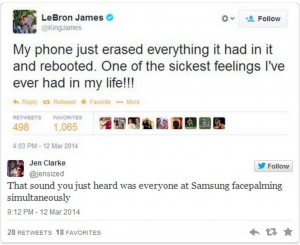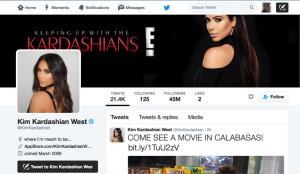Social media use has rapidly increased ever since the idea of Facebook became the norm to society. Many consumers are on social media everyday, including myself and I would honestly miss it if I were not able to access Twitter. Romero et al (2011) describe twitter as the fastest growing social media platform, which is why all advertisers and celebrities are attempting to exploit it. Social media has become a way of life for many people whether it is, as they want to connect with friends or simply receive travel and news information. Social media is not just used by consumers but also businesses and even the government with it being a very important platform of speech and representation for most especially celebrities (Qualman, 2009).
Celebrities have used the increased importance of social media effectively to successfully market themselves to both further their career in their respective fields but to also sell their own products and become an entrepreneur. Marwick (2013) explains how the introduction of social media allowed people to successful brand themselves. People adopt social media like a work place describing the people they’re interacting as co-workers (Marwick, 2013), social media became a way in which many different types of people are able to communicate which one another. Celebrities have used social media to connect with consumers and consumers now follow what celebrities wear what they eat and even where they go.
With celebrities influence so great in this current generation it was only a matter of time before businesses and companies started to use celebrities to market their products on social media where they are in control. Celebrities such as Kim Kardashian have over 45m people choosing to read very tweet she posts which means if a business are able to get her to tweet about their product or service there is a potential for large amounts of exposure and considerably amount of interest.
Celebrities are used as a marketing tool similarly to TV and or Radio. Marketing literature does not mention celebrities themselves being a brand only the way in which they endorse others (Johns and English, 2016).
However to understand the effectiveness of celebrities you must thinking of the negatives also of them being used as advertising billboards when on social media. This is often more common with reality television stars as many are just given free products to endorse them but still can have a positive effect on the brand. The downside to celebrity endorsement on social media is the interlinking image that comes with the business and the celebrity. For many brands imagine is one the most crucial parts of their marketing campaign. You wouldn’t see Rolex endorsing a hot headed aggressive celebrity as their imagine is high class. Social media makes it easier for celebrities to voice their opinions and views meaning that if there views or ideas conflict with the imagine the business is portraying it could be highly detrimental to the brands image. For example LeBron James’ tweet saying his phone had erased everything and that it was the worst feeling ever (below). Samsung was endorsing LeBron James and complaining about his phone was not the best thing to do. Despite James deleting the quickly his millions of followers had caught onto it. The reply by Jen Clarke (below) represents how Samsung must have felt and shows that endorsements by celebrities is not always beneficial to the business not all publicity is good publicity.

The marketing of products by celebrities is a very effective way of gaining publicity and customers but getting celebrities endorsement creates a link between the person and the business that in some cases cannot be reversed such as ‘the go compare man (below)’ who many will only him from their adverts and therefore his imagine will directly effect their business.
References
Carter, J. (2014). Six celebrity endorsements that have gone badly wrong. [online] MyCustomer. Available at: http://www.mycustomer.com/marketing/strategy/six-celebrity-endorsements-that-have-gone-badly-wrong [Accessed 6 May 2016].
Galuba, W., Asur, S. and Huberman, B. (2011). Influence and Passivity in Social Media. SSRN Electronic Journal.
Johns, R. and English, R. (2016). Transition of self: Repositioning the celebrity brand through social media—The case of Elizabeth Gilbert. Journal of Business Research, 69(1), pp.65-72.
Marwick, Alice Emily. (2013) Celebrity, Publicity, and Branding in the Social Media Age, Yale University Press, New Haven.
Qualman, E. (2009). Socialnomics. Hoboken, N.J.: Wiley.


